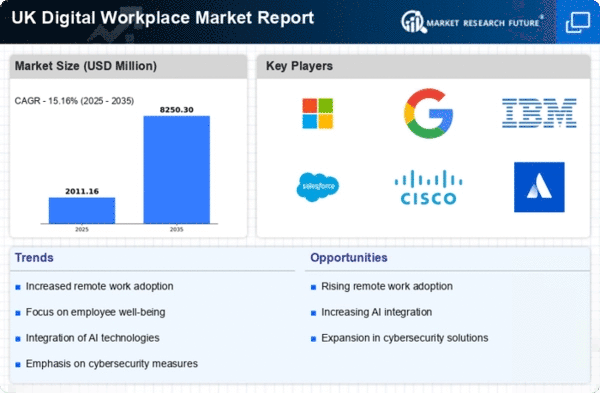Adoption of Data Analytics
The adoption of data analytics is emerging as a key driver in the digital workplace market. Organizations are increasingly leveraging data to inform decision-making and improve operational efficiency. In the UK, the data analytics market is expected to grow by 25% over the next five years, reflecting the rising importance of data-driven strategies. Companies are utilizing analytics to assess employee performance, optimize workflows, and enhance customer experiences. This trend suggests that businesses are becoming more data-centric, leading to a transformation in how they operate. The digital workplace market is thus adapting to this shift, with a growing demand for analytics tools that provide actionable insights and foster a culture of continuous improvement.
Rise of Remote Work Culture
The digital workplace market in the UK is experiencing a notable shift towards remote work culture. This transformation is driven by the increasing demand for flexible working arrangements, which allows employees to work from various locations. According to recent data, approximately 30% of the UK workforce is now engaged in remote work, a trend that is likely to persist. This shift necessitates the adoption of digital tools and platforms that facilitate collaboration and communication among remote teams. As businesses adapt to this new normal, investments in digital workplace solutions are expected to rise, potentially reaching £10 billion by 2026. The digital workplace market is thus poised for growth as companies seek to enhance productivity and employee satisfaction through effective remote work strategies.
Focus on Employee Well-being
The digital workplace market is increasingly influenced by a focus on employee well-being. Organizations are recognizing that a healthy work environment is crucial for productivity and retention. In the UK, studies indicate that companies prioritizing employee well-being experience a 20% increase in employee satisfaction and a 10% reduction in turnover rates. This awareness is driving investments in digital tools that promote mental health, work-life balance, and overall well-being. Features such as wellness apps, flexible scheduling, and virtual support services are becoming integral to the digital workplace. As businesses strive to create a supportive work culture, the digital workplace market is likely to expand, with a growing emphasis on solutions that enhance employee health and happiness.
Emphasis on Cybersecurity Measures
As the digital workplace market evolves, the emphasis on cybersecurity measures becomes increasingly critical. With the rise of remote work, the risk of cyber threats has escalated, prompting organizations to invest heavily in robust security solutions. In the UK, it is estimated that cybercrime costs businesses over £27 billion annually, highlighting the urgent need for enhanced security protocols. Companies are now prioritizing the implementation of advanced cybersecurity measures, including encryption, multi-factor authentication, and employee training programs. This focus on security not only protects sensitive data but also fosters trust among employees and clients. Consequently, the digital workplace market is likely to see a surge in demand for cybersecurity solutions, as organizations strive to safeguard their digital environments.
Integration of Collaboration Tools
The integration of collaboration tools is a significant driver in the digital workplace market. As teams become more dispersed, the need for effective communication and collaboration tools has intensified. In the UK, the market for collaboration software is projected to grow by 15% annually, reflecting the increasing reliance on these technologies. Tools such as video conferencing, project management software, and instant messaging platforms are becoming essential for maintaining productivity and engagement among remote teams. This trend indicates a shift towards a more interconnected digital workplace, where seamless collaboration is paramount. The digital workplace market is thus adapting to these needs, with companies investing in comprehensive solutions that enhance teamwork and streamline workflows.
















